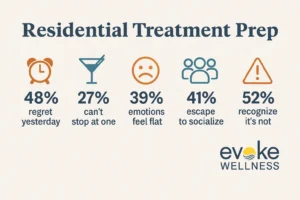You might not know if you’re “ready.”
You might not even be 100% sure you need treatment.
But something in you is still curious. Still scrolling. Still here.
That matters.
Whether you’re sober-curious, quietly questioning your relationship with alcohol or substances, or just done with how heavy life has felt lately, considering a residential treatment program is a brave, vulnerable, and deeply personal decision.
At Evoke Wellness TX in San Marcos, we work with people who aren’t in crisis—but are done ignoring the signs. This guide isn’t here to push you. It’s here to help you prepare, practically and emotionally, if you decide to take that next step.
Because even if you’re not sure what healing looks like yet—just wanting something different is reason enough to begin.
Start With What’s Whispering—Not Just What’s Screaming
A lot of people think residential treatment is for rock bottom only. It’s not.
More and more people are coming into care before things implode. Not because their life is in ruins—but because their inner world is asking for help.
Maybe you’ve noticed:
- Mornings where you’re ashamed of the night before
- “Just one drink” becoming three or four more often than not
- Emotional flatness even when things are going well
- Socializing that feels more like escaping
- A quiet internal voice saying, “This isn’t sustainable”
You don’t need a crisis to justify healing. You don’t need to explain away your curiosity.
You just need to pay attention to that whisper—and follow it long enough to see where it leads.
Begin With a Soft YES—You’re Not Locked In
You don’t need to decide everything right now. Preparing for a residential stay doesn’t mean you’ve signed your name in ink.
It just means you’re gathering information. You’re taking yourself seriously. You’re exploring.
That matters.
The “soft yes” is an act of self-trust:
“Yes, I’ll talk to someone.”
“Yes, I’ll see what my options are.”
“Yes, I’ll imagine what taking care of myself this way might look like.”
Even that step can begin to shift your relationship with your pain—and your potential.
Tell One Person You Trust
This step might feel optional—but it’s one of the most powerful things you can do.
Say it out loud.
Not to post it. Not to perform it. Just to be heard.
Choose one person in your life who feels safe. You don’t need them to solve anything. You just need a witness.
You might say:
- “I’m thinking about going into treatment. Can I talk it through with you?”
- “I’m not in crisis, but I know something needs to change.”
- “I’m curious about what healing could look like. I’m scared, but I’m exploring.”
Naming it makes it real. It makes it harder to ignore. And it makes space for connection in a journey that can otherwise feel isolating.
Get Clear on the Logistics—Then Let Them Go
You might start spiraling here. That’s normal.
“What about my job?”
“What do I do with my dog?”
“Can I afford this?”
“How do I explain where I’m going?”
You don’t have to answer all those questions alone.
At Evoke, we help walk you through:
- Medical leave paperwork (FMLA or short-term disability)
- Financial planning, insurance coverage, and payment options
- What to pack and what to leave at home
- How to notify work, family, or friends (if you want to)
- Travel arrangements and timing
The moment you say, “I’m considering this,” our admissions and clinical team step in to support you. You won’t have to carry the weight of preparation alone.
Expect Discomfort—Not Disaster
Here’s a truth no one tells you about residential treatment:
It might feel worse before it feels better.
Not because it is bad—but because you’re slowing down a system (your body, your emotions, your behaviors) that’s been running on survival mode for a while.
In your first few days, you might feel:
- Boredom
- Restlessness
- Embarrassment
- Regret
- The urge to leave
This is normal. And it usually passes.
Why? Because your nervous system is recalibrating. You’re detoxing not just from substances, but from numbing, avoiding, escaping, controlling.
Give it 3–5 days. Most people find a rhythm. They make a friend. They let out a deep breath they didn’t realize they were holding.
And they start to feel… present. For the first time in a while.
What You’ll Actually Do in Residential Treatment
The structure isn’t prison. It’s support.
Here’s a snapshot of what your days might include at Evoke TX:
- Morning routines: Gentle structure to start your day regulated
- Group therapy: Real conversations, not forced shares
- Individual sessions: You and a therapist—no script, just truth
- Body work: Yoga, movement, or grounding practices
- Life skills and psychoeducation: Because this isn’t about surviving—it’s about living
- Rest: Yes, rest is part of treatment. You don’t have to earn it.
You’ll be fed. You’ll be held. You’ll be asked to show up—but not in ways that overwhelm.
You’ll be invited to meet yourself without armor.
And it won’t all be painful—some of it might actually feel like relief.
What to Bring (and What to Leave)
People worry they’ll bring the wrong things. But the most important thing you bring is your willingness.
Still, here’s a helpful list:
Bring:
- Comfortable clothes
- Toiletries (no alcohol-based products)
- A journal or book
- A small item that feels grounding (photo, necklace, etc.)
- Prescription medications (approved beforehand)
Leave:
- Substances or vapes
- Outside expectations
- “I have to figure everything out now” energy
- The shame that says “you shouldn’t be here”
You’re not packing to prove anything. You’re packing to come home to yourself.
Don’t Let Fear Pose as Logic
Sometimes the part of you that’s scared of change gets clever.
It sounds like:
- “You’re not that bad.”
- “People will think you’re weak.”
- “What if nothing changes?”
- “You don’t have time for this.”
We’re not here to argue.
But we are here to remind you: fear often wears a mask of practicality.
And yes—some part of you might still feel unsure.
But another part of you—the one that clicked on this blog, that’s reading this far—is ready. Maybe just barely. But enough.
Listen to that part. It might just save your life—or help you finally start living it.
FAQs: Preparing for Residential Treatment at Evoke TX
Do I have to stop drinking or using before I arrive?
Not necessarily. We provide medical detox if needed. Our team will walk you through a safe plan depending on your situation and substance use history.
Will I have access to my phone?
There are designated times for phone use, especially for family communication. This is to help you focus and stay present without distractions.
Is this only for people with serious addiction?
No. Many of our clients are sober-curious, emotionally exhausted, or exploring a different way of living. You don’t have to meet a specific threshold to be here.
How long is the stay?
Most stays range from 30 to 45 days, but your treatment plan will be personalized. You’ll work closely with your therapist and care team to determine what’s right for you.
Will I be pressured into 12-step programs?
No. We honor all paths to recovery. Some clients benefit from 12-step frameworks, others prefer holistic or trauma-focused modalities. We tailor care to your preferences.
You Don’t Need a Guarantee. You Just Need a Beginning.
If you’re still here, reading this, something in you wants to move.
Maybe not fast. Maybe not loudly.
But enough.
And that’s where change begins—not with certainty, but with a quiet yes.
Call (888)450-2285 or visit our Residential Treatment Program in San Marcos, Texas when you’re ready. We’ll meet you where you are—not who you think you’re supposed to be.



